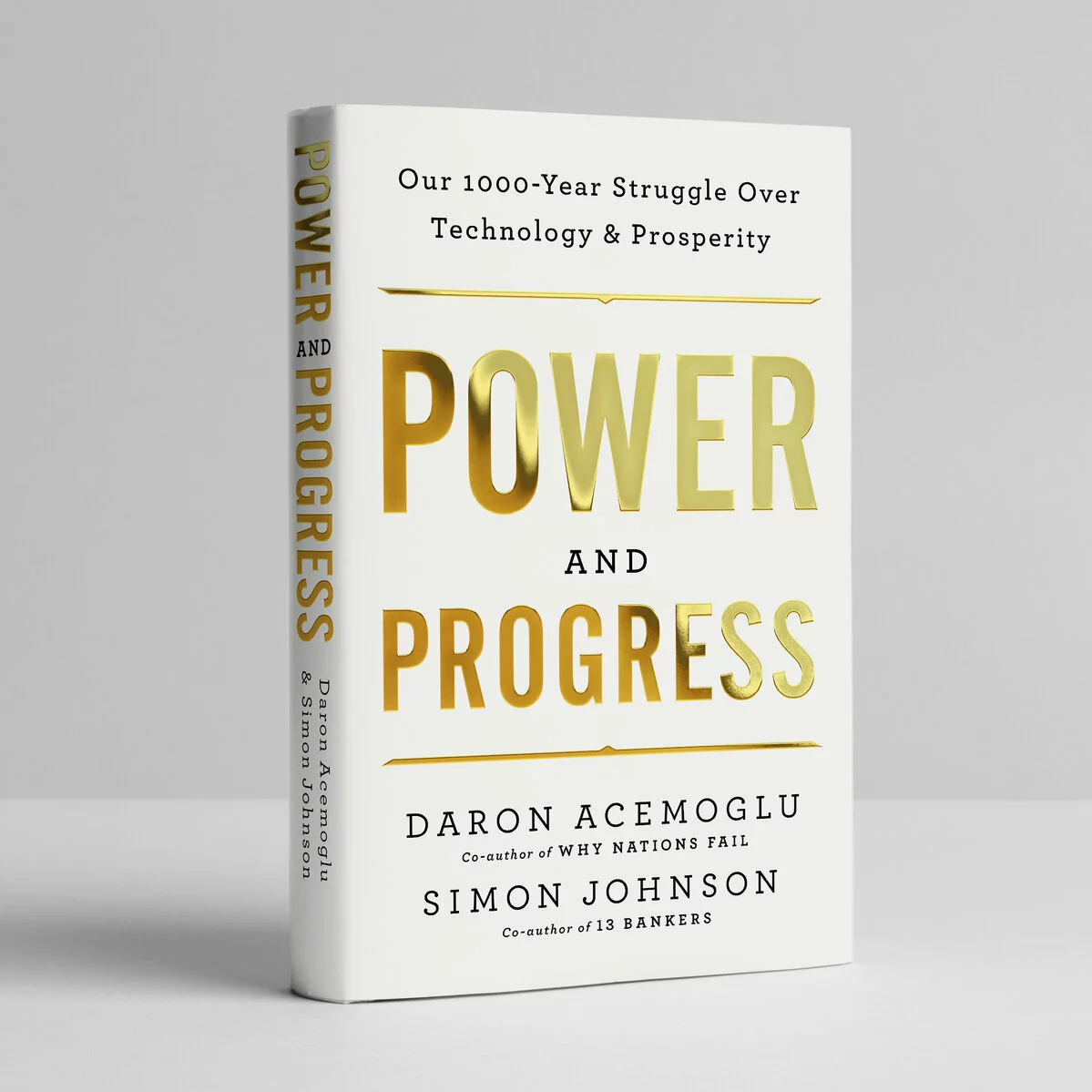Book Review: Power and Progress
According to them, the first phase of the industrial revolution impoverished workers, and we are now facing a similar threat.
- But, they assure readers, the trajectory of technology is a choice, and it does not have to be left to the market.
- This shared prosperity crashed in the 1980s with the new information technology, automation, and free-market doctrines like Milton Friedman’s.
- Today’s advances in artificial intelligence threaten to make the situation worse.
- Moreover, social media works against democracy.
- We need to reorient technology to a “socially beneficial trajectory.”
The book’s economic and historical scope is wide and ambitious. One finds a few good points in its 500 pages—for example, the danger of technology used for government surveillance. However, many of the authors’ claims are doubtful and often puzzling.
The closest they come to defining it is when they write that “democracy, above all else, is about a multitude of voices, critically including those of ordinary people, being heard and becoming significant in public policy decisions.”
But how are these voices aggregated?
- What about the opinion of Hayek and many classical liberals that democracy is merely a way to assure peaceful transfers of power?
In short, it seems to me that Acemoglu and Johnson espouse a simple and angelic conception of democracy, which may be synonymous with “good” and “social.” I suggest they would greatly benefit from studying the public-choice explanations of how collective choices are made in different forms of democracies—majoritarian versus constitutionally limited, for example.
The government that Acemoglu and Johnson hope will follow their advice is not a government found in the real world, but their ideal government, not of this world. Consider, for example, their discussion of the 2007–2009 Great Recession, for which they blame greedy corporations.- The only blame they assign to the federal government is to not have regulated enough.
- It was Ginnie Mae, a government sponsored enterprise (GSE) created by Congress in 1968, that pioneered the issuance of MBSs in 1970.
- Up to the MBS crash, numerous politicians were on record claiming the desirability of more mortgages for poorer households. For example, then-congressman Barney Frank wanted to “roll the dice” and “get Fannie and Freddie [two other federal mortgage GSEs] more deeply into helping low-income housing.”
- As for a lack of government supervision, Stanford economist John B. Taylor noted that hundreds of regulating bureaucrats were working on the premises of large banks before the crash.
Still, Acemoglu and Johnson maintain that a benevolent, powerful, and effective government would lead society to nirvana: “We must find ways of countering power with alternative sources of power and resisting selfishness with a more inclusive vision.” But nirvana is a dangerous mirage.
To be fair to the authors, they do mention the constraint of the rule of law once, and constitutional constraints a couple of times. But they don’t explain how the vast new powers they want to grant to the state are consistent with such constraints.
They notably propose to “redirect technological change,” remake digital technologies, and create broader-based trade unions.
They want- “worker-friendly technologies,”
- government-funded worker training programs,
- data ownership regulations,
- the break-up of tech giants (Google, Facebook, Amazon), and
- digital advertisement taxes.
- It nearly goes without saying that “society should strengthen its existing social safety net.”
- They consider any technological innovation and probably any advancement of any sort as creating a sort of “rent” to be shared between “labor” and “capital” under the diktats of some political authority.
- They don’t seem to realize that there is no such floating rent belonging to nobody and waiting to be politically apportioned.
- Everything belongs to the actors without whom it wouldn’t otherwise exist,
- and free markets are the only known mechanism to distribute these rewards so that opportunities and production are maximized.
Despite its authors’ good intentions, Power and Progress looks like the work of philosopher-kings à la Plato.
German poet and philosopher Friedrich Hölderlin had an answer when he wrote (as quoted by Hayek) that “what has always made the state a hell on earth has been precisely that man has tried to make it his heaven.”
World Bank: Poorest countries facing worst debt since 20068 hours
The 26 poorest nations in the world are more heavily in debt than any time in the last 18 years, according to a new report. Climate change and conflict are major drivers of poverty in the affected countries.
The list includes Afghanistan, Yemen, Syria, and North Korea. Most of the other nations are in sub-Saharan Africa, and include Ethiopia and Chad.
- With an annual per capita income of less than $1,145 (€1,050) a year, the World Bank said these countries "are poorer today on average than they were on the eve of COVID-19, even though the rest of the world has largely recovered."
"At a time when much of the world simply backed away from the poorest countries, IDA has been their lifeline," World Bank chief economist Indermit Gill said in a statement.
"Over the past five years, it has poured most of its financial resources into the 26 low-income economies, keeping them afloat through the historic setbacks they suffered."



.png)




No comments:
Post a Comment